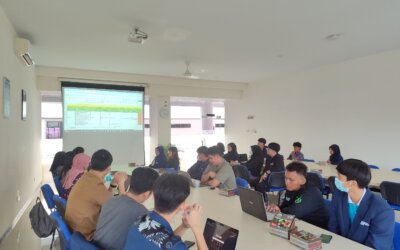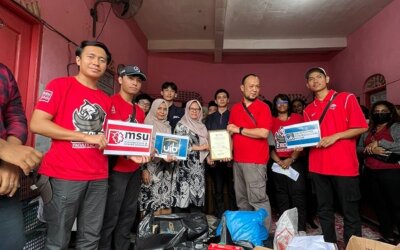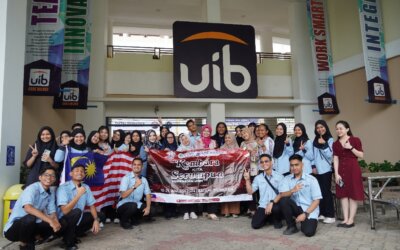The Bachelor of Law Program at Universitas Internasional Batam received grant assistance from the Kampus Merdeka Competition Program (PKKM) 2022. One of the activities carried out was improving the quality of learning materials. The scheme for implementing the quality improvement activities for learning materials is divided into two workshop activities. The first is a series of workshops on the preparation of lesson plans with a case-solving approach and is followed by a series of workshops on the preparation of innovative learning modules. This workshop activity was carried out in a hybrid manner with resource persons and several participants attending online and course lecturers attending offline in the Video Conference room, Universitas Internasional Batam.
Tuesday, 2 August 2022, the Bachelor of Law Program held a series of workshops on the preparation of RPS with a case-solving approach. This workshop series consists of 6 series of meetings which are guided by 3 speakers who have expertise in case solving learning methods and preparation of lesson plans, namely, Prof. Dr. Handoyo Puji Utomo, Prof. Dr. Sigit Riyanto, S.H., LL.M, and Prof. Dr. Mustaji, M.Pd along with the PKKM activities in the Bachelor of Accounting Program. Prof. Dr. Handoyo Puji Utomo started a series of workshops by delivering material on case-solving-based learning methods as well as project-based learning. the delivery of this material as a prologue to the two undergraduate programs in Law and Accounting that received the 2022 PKKM Grant funding in the hope of equipping the RPS developer lecturers in the preparation later.
Tuesday, August 9, 2022 to August 18, 2022, the series of activities for the preparation of the case-solving approach RPS was continued with guidance by Prof. Dr. Sigit Riyanto, S.H., LL.M with 4 main topics, namely Integration of Case-based Learning Methods with RPS, Formative and Summative Assignments, Designing mid and final test questions and ending with RPS Review with a case-solving method approach. The activity was opened by the dean of the Faculty of Law, Dr. Lu Sudirman with the hope that the lecturers, especially UIB lecturers, can absorb as much and as well as possible the knowledge that will be shared by the speakers.
Nowadays, there is often a wrong stigma about learning in law, which states that in law, most of them are memorized. However, law is the science of reasoning. So, to develop this reasoning science, it is necessary to create learning methods that attract students’ interest in the classroom. Prof. Sigit conveyed about the purpose of the case-solving learning method which in this case is Case Based Learning and Problem Based learning whose achievements are so that undergraduate law students have different ways of thinking from students in other fields. The current learning paradigm is no longer about what students should learn, but what students can do both when they are in class and when they graduate. Or what is now believed to be OBE (Outcome Based Learning).
In this series, Prof. Sigit tries to invite participants to discuss together to identify the weaknesses of the current learning curriculum. According to him, traditional learning often hinders students’ abilities because it is less relevant to real life cases, where it is textbook learning so that students often find answers via the internet easily. It is undeniable that this incident often occurs in our environment, especially in universities. In the conventional curriculum map, there are several weaknesses that can be found, namely centered on cognitive abilities and superficial skills, lack of practical issues, relevance, and up-to-date, and using inappropriate learning method designs. In fact, learning should be flexible and directed. For example, the division of fields in Legal Studies is only divided when in lectures or in the academic world, but when it comes to the general public, there is only one law, in the eyes of the legal community it is not divided according to its field, such as civil, agrarian, etc. So students need to be faced with real problems like this to be able to face society
Through this learning method with a case-solving approach, it can provide an interesting, relevant and ‘down to earth’ experience for students through internal cases designed for student discussion. Prof. Sigit, emphasized that teaching legal science is not only a matter of describing what the law looks like, but education in legal science must be carefully designed and assessed and taught not in the abstract but in the context and complex processes of modern society. Prof. Sigit also reminded that as a teacher, always instill in yourself that learning comes first before teaching. The meaning is that before speaking in class forums, or workshops, educators must first learn about what is being conveyed. Despite the status of a lecturer as a teacher, knowledge will continue to develop, real problems will continue to come so that teachers need to continue to learn to update their knowledge. So that learning can be a long live learning for students and for individual teachers themselves.
Taking the best practice example from the UGM Faculty of Law, Prof. Sigit invites lecturers to discuss through sample case discussions in class, the case given is a factual case regarding the Indonesian invasion of Timor Leste in 1975 which then chose to be independent until it was determined on 22 March 2002. The purpose of this class discussion is so that students can build a strong conceptual foundation and can apply legal theory well. Through this example, Prof. Sigit tries to explain the parallel concept of formative and summative assessment, simultaneously the development and understanding of students (formative) during the learning process can be assessed as well as the learning achievement targets of the targeted courses that are summative.
So that this assignment is often displayed in the form of cases that can be used as material for student discussion to build critical and systematic thinking skills as an effective critical reasoning strategy for students. So that lecturers need to explore various types of cases as teaching materials in each lecture. According to Prof. Sigit, a good case to be used as a case in learning is a case that is connected with theory and learning outcomes. cases can be in the form of real cases that exist and have occurred or cases that are designed by themselves but are still based on real cases so that the legal theory can be justified. Characteristics of cases for good assignments have 8 main points: narratives with education, realistic narratives about dilemmatic situations, situations/events that require analysis, are relevant, motivates, invites involvement, consolidation/integration of various things and in the form of cases that can be a transfer of knowledge, value and attitude.
Continuing to the third topic, namely the design of mid and final test questions, there are several things that must be considered, one of which is guidance, a good exam question is a question that does not limit students’ thinking abilities but still provides guidance / or guidance so that evaluations can be in accordance with learning achievements. Next is feedback, in its implementation, the implementation of the exam does not only occur in one direction. Of course, when carrying out the exam, students expect feedback from the lecturer so that students can know their weaknesses so that they can further improve their abilities. Regarding feedback, sometimes it is also needed by lecturers, this feedback is given by students regarding the learning provided as well as an evaluation of assignments and exam questions given whether they are in accordance with the students’ abilities. So that lecturers can also improve their ability to master the class in the future.
Prof. Sigit conveyed about the questions that arise during the assessment and evaluation of learning for students which generally occur in conventional classes with only exams and assignments, namely “Are students really able to study perfectly?”. Because learning is actually a continuous activity where lecturers provide learning, students apply what they learn, then lecturers assess and evaluate learning outcomes, and students apply the results of the evaluation again. So continuously like a learning circle that does not stop. So that the selection of the application of the right learning method in the classroom becomes very crucial in order to provide experiential learning and one of them is a learning method with a case-solving approach, either Case Based Learning or Problem Based Learning.
The last series with Prof. Sigit closed with a review of the RPS that had been prepared by the class teacher in the Law Science undergraduate program targeted at the 2022 PKKM program. In the discussion, Prof. Sigit said that RPS can be designed dynamically or agilely so that it can be changed according to the needs of the class. Adjusting to the variety of UIB students, some of whom have entered the world of work, so that the RPS can adapt to the needs of students, but fundamental theories must still be provided. In the same opportunity to provide learning that is in accordance with their profession, it can be applied with case studies or problem-based learning. Although it is undeniable that there is a gap that occurs, where UIB students who incidentally have entered the world of work and also learning on campus. Where in the academic world a lot of talk about theory and on the contrary the world of work talks about practical abilities. However, Prof. Sigit said that the theory conveyed in lectures was a testable hypothesis, which means a hypothesis that has been proven or confirmed. For example, practice case studies can be used as evidence or confirmation that the theory being taught is valid through real learning in the field. Prof. Sigit said that in designing learning outcomes in the case-solving approach RPS, the bloom taxonomy ability of students to know and understand was very well accepted but it would be even better if they could achieve the ability to analyze and apply. So that students get the opportunity to develop critical thinking skills through activities such as brainstorming, snowballing, discussion etc.
In the last series of workshops on the preparation of RPS with case-solving methods which was held on August 26, 2022, which was conveyed by Prof. Dr. Mustaji, M,Pd. This time, the RPS developer lecturer received training on the design of the grading rubric. This activity is a training in which the RPS developer lecturers get the opportunity to discuss the results of the RPS that have been designed based on the input of the two previous resource persons.
In the concept of case-solving approach learning, the rubric of assessment in classroom learning must include learning theories such as behaviorism, cognitiveism, constructivism, and connectivism. During the review process Prof. Mustaji conveyed about the importance of learning syntax in RPS design so that the RPS that was compiled had a strong basis in the evaluation and assessment process for students and also supporting lecturers. A good RPS must include 6 syntaxes starting from determining basic questions, design and development, scheduling, monitoring, testing results and evaluating experiences where these six syntaxes include activities that will be carried out by lecturers and students. Through this syntax, the assessment rubric for each assessment given in the form of assignments, quizzes or others can be designed so that they are in accordance with the designed learning outcomes.







